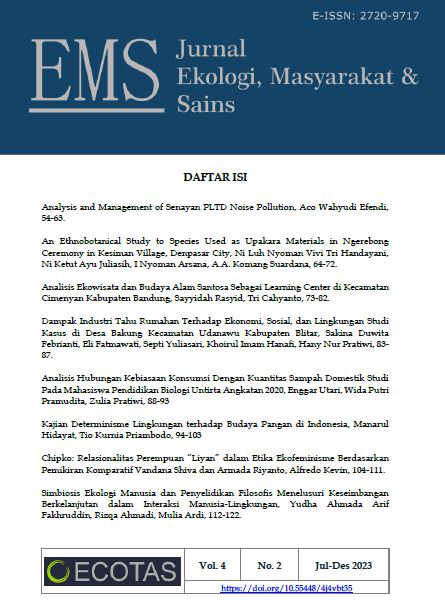Simbiosis Ekologi Manusia dan Penyelidikan Filosofis
Menelusuri Keseimbangan Berkelanjutan dalam Interaksi Manusia-Lingkungan
DOI:
https://doi.org/10.55448/c6fcpz21Kata Kunci:
filosofi, hidup harmoni, keberlanjutan, rasionalitas, teori kritisAbstrak
Penelitian ini bertujuan untuk mengartikulasikan karakter ekologi manusia yang pada dasarnya bersifat filosofis. Ini merupakan penelitian kualitatif dengan metode verstehen, interpretasi dan hermeneutika. Hasil penelitian menunjukkan karakter ekologi dipahami sebagai kepedulian untuk membantu individu yang terlibat dalam interaksi manusia-lingkungan yang problematis, mengidentifikasi cara-cara untuk mengubah interaksi tersebut supaya tercapai keseimbangan berkelanjutan antara klaim moral dan kebutuhan. Dengan demikian dapat dikatakan bahwa karakter ekologi manusia menjelaskan apa yang dimaksud sebagai perpaduan multidisipliner, interdisipliner, transdisipliner, dan bahkan adisipliner dari ilmu-ilmu biologi dan sosial. Melalui pemahaman ini, manusia dapat memberikan panduan secara tindakan terhadap gagasan hidup yang baik tanpa menjadi aktor yang memihak bentuk kehidupan tertentu. Sehingga terjadi harmoni antara pemanfaatan dan pemeliharaan sumberdaya alam dalam menjaga lingkungan hidup.
Referensi
Aristotle. 2011. “Nichomachean ethics.” Dalam The Basic Works of Aristotle, disunting oleh Richard McKeon, 935–1126. New York: Random House.
Barlian, Eri, dan Yunhendri Danhas. 2022. Konsep dan Aplikasi Ekologi Manusia. Yogyakarta: Deepublish.
Bhaskar, By Roy, Petter Naess, dan Karl Høyer, ed. 2011. Ecophilosophy in a World of Crisis: Critical Realism and the Nordic Contributions. London: Routledge.
Borden, Richard J., Jamien Jacobs, dan Gerald L. Young. 1986. Human Ecology: A Gathering of Perspectives. Society for Human Ecology.
Carson, Rachel L., dan Linda J. Lear. 2022. Silent Spring. Mariner Books Classics. https://www.rachelcarson.org/silent-spring.
Cifrić, Ivan, Filozofski fakultet, dan Zagreb. 2002. “Dubinski ekološki pokret: „Ekozofija T” Arne Naessa [Deep Ecological Movement: Arne Naess’s ‘Ecosophy T’].” Soc. Ekologija 11 (1–2): 29–55.
Clarke, Robert. 1973. Ellen Swallow: The woman who founded ecology. Chicago, IL: Follett.
Clowney, David, dan Patricia Mosto, ed. 2009. Earthcare: An Anthology in Environmental Ethics. Lanham: Rowman & Littlefield Publishers.
Creswell, John W., dan J. David Creswell. 2018. Research Design: Qualitative, Quantitative, and Mixed Methods Approaches. 5 ed. SAGE Publications.
Dyball, Robert. 2010. “Human ecology as open transdisciplinary.” Dalam Tackling Wicked Problems Through the Transdisciplinary Imagination, 1 ed., 273–84. London: Earthscan.
Fischer, Joern, Robert Dyball, Ioan Fazey, Catherine Gross, Stephen Dovers, Paul R Ehrlich, Robert J Brulle, Carleton Christensen, dan Richard J Borden. 2012. “Human Behavior and Sustainability.” Frontiers in Ecology and the Environment 10 (3): 153–60. https://doi.org/10.1890/110079.
Funtowicz, Silvio, dan Jerome Ravetz. 1991. Ecological economics: The science and management of sustainability. New York, NY: Columbia University.
Gaziano, Emanuel. 1996. “Ecological Metaphors as Scientific Boundary Work: Innovation and Authority in Interwar Sociology and Biology.” American Journal of Sociology 101 (4): 874–907. https://doi.org/10.1086/230783.
Geiger, M. 2002. “Spiritualni aspekti ekofeminizma [Spiritual Aspects of Ecofeminism].” Soc. Ekologija 11 (1–2): 15–17.
Jennings, Viniece, Jessica Yun, dan Lincoln Larson. 2016. “Finding Common Ground: Environmental Ethics, Social Justice, and a Sustainable Path for Nature-Based Health Promotion.” Healthcare 4 (61). https://doi.org/10.3390/healthcare4030061.
Jonge, Eccy de. 2004. Spinoza and Deep Ecology Challenging Traditional Approaches to Environmentalism. 1 ed. Aldershot: Ashgate.
Kopnina, Helen, Haydn Washington, Bron Taylor, dan John J Piccolo. 2018. “Anthropocentrism: More than Just a Misunderstood Problem.” Journal of Agricultural and Environmental Ethics 31 (1): 109–27. https://doi.org/10.1007/s10806- 018-9711-1.
Koprek, Ivan. 1991. “Ekološka kriza - izazov praktičnoj filozofiji [Ecological Crisis - Challenge for Practical Philosophy].” Obnov. Zivot 46 (1): 28–37.
Krznar, Tomislav, ed. 2013. “Man and Nature: Contribution to the Determination of their Relationship.” Dalam Čovjek i priroda, Prilog određivanju odnosa. Zagreb: Pergamena.
Lawrence, Roderick J. 2001. Our fragile world: Challenges and opportunities for sustainable development. Disunting oleh M.K Tolba. Oxford, UK: Encyclopedia of Life Support Systems.
Lubchenco, Jane. 2017. “Environmental Science in a Post-Truth World.” Frontiers in Ecology and the Environment 15 (1): 3–3. https://doi.org/10.1002/fee.1454.
Markus, Tomislav. 2003. “Više-nego-ljudski-svijet. Dubinska ekologija kao ekološka filozofija.” Soc. Ekologija, Croatian, 12 (3–4): 143–64.
Maryanti, Elfindri, dan Leli Sumarni. 2022. “Edukasi dan Sosialisasi Pemanfaatan Ekologi Rumah Tangga melalui Prinsip Pembangunan Berkelanjutan.” WARTA PENGABDIAN ANDALAS 29 (1): 9–15.
Maryanti, Rahmatia, Nursini, dan Sanusi Fattah. 2020. “Measuring Sustainability Development Index in Indonesia.” International Journal of Innovative Science and Research Technology 5 (2).
Merchant, Carolyn. 2005. Radical Ecology: The Search for a Livable World. 2 ed. New York: Routledge.
Muzur, Amir, dan Iva Rinčić. 2015. Van Rensselaer Potter i njegovo mjesto u povijesti bioetike. Zagreb: Pergamena.
Nelson, Michael Paul, Strachthan Donnelly, Ceara Donnelley, dan Bruce Jennings. 2019. “At the Intersection of Ecology, Philosophy, and Ethics.” Bulletin of the Ecological Society of America 100 (2): 1–3.
Patty, Brayen. 2021. “MANUSIA, EKOLOGI DAN TEOLOGI: Kajian Eko-Teologi Terhadap Krisis Lingkungan Di Pantai Galala.” TANGKOLEH PUTAI 18 (2): 118–28. https://doi.org/10.37196/tp.v18i2.84.
Ravetz, Jerome R. 1997. “The Science of ‘What-If?’” Futures 29 (6): 533–39. https://doi.org/10.1016/S0016-3287(97)00026-8.
Ravetz, Jerome R. 2006. “Post-Normal Science and the Complexity of Transitions towards Sustainability.” Ecological Complexity, Complexity and Ecological Economics, 3 (4): 275–84. https://doi.org/10.1016/j.ecocom.2007.02.001.
Ricoeur, Paul. 2006. Hermeneutika Ilmu Sosial (Terjemahan). Kreasi Wacana.
Robbins, Paul. 2011. Political Ecology: A Critical Introduction. 2 ed. Wiley-Blackwell.
Sanderson, J. Burdon. 1893. “On the Origin of Biology and Its Relation to Other Branches of Natural Science: Being a Part of the Presidential Address Delivered before the British Association for the Advancement of Science at Nottingham on September 13th, 1893.” Br Med J 2 (1707): 613–17. https://doi.org/10.1136/bmj.2.1707.613.
Singer, Peter. 2017. Practical Ethics. 3 ed. Cambridge: Cambridge University Press.
Swallow, Pamela Curtis. 2014. The Remarkable Life and Career of Ellen Swallow Richards: Pioneer in Science and Technology. Hoboken, NJ: Wiley.
Talukder, MD. Munir Hossain. 2018. Nature and Life: Essays on Deep Ecology and Applied Ethics. Newcastle upon Tyne: Cambridge Scholars.
T.V., Geetha Devi. 2019. Understanding Human Ecology: Knowledge, Ethics and Politics. Abingdon: Routledge.
Worster, Donald. 1977. Nature’s economy: The roots of ecology. San Francisco, CA: Sierra Club Books.
Unduhan
Diterbitkan
Terbitan
Bagian
Lisensi
Hak Cipta (c) 2023 Jurnal Ekologi, Masyarakat dan Sains

Artikel ini berlisensi Creative Commons Attribution-NonCommercial 4.0 International License.
Penulis artikel yang diterbitkan di Jurnal EMS diizinkan untuk mengarsipkan sendiri versi terbitan/PDF di mana saja.






























